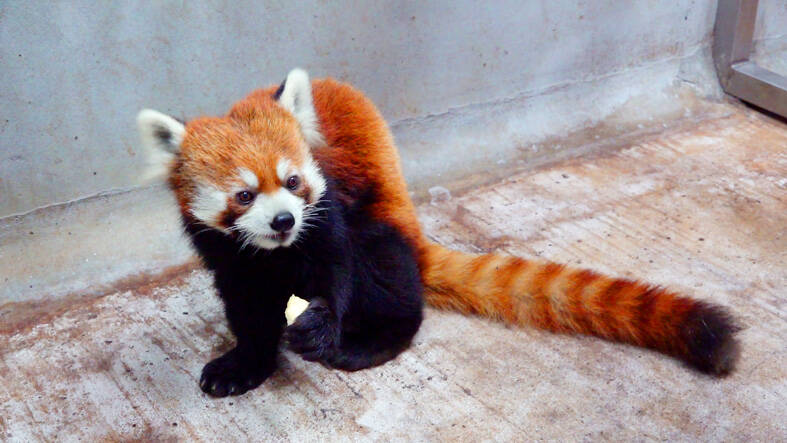A four-year-old male red panda from the Hamamatsu Zoological Gardens in Japan has arrived in Taiwan, Taipei Zoo said on Friday.
The red panda, which has been named Wei Lai (未來), is undergoing a one-month quarantine after arriving on Thursday evening, Taipei Zoo said in a statement.
Taipei Zoo director Chen I-tsung (諶亦聰) said that it has previously imported three red pandas, one male and two females, from China in 2014.

Photo courtesy of the Taipei Zoo
Since then, Taipei Zoo has bred nine additional red pandas, Chen added.
However, as all red pandas suitable for breeding are offspring of the animals from China, an animal from another family is needed to ensure genetic health and diversity, Chen said.
With assistance from the Japanese Association of Zoos and Aquariums, Taipei Zoo personnel visited Japan in June to discuss an animal exchange, the statement said.
Wei Lai was chosen in July based on factors including his age and his inbreeding coefficient, it said.
Visitors to the zoo would be able to see Wei Lai in April at the earliest, it said.
Chen said Taipei Zoo had more than 20 years of experience caring for red pandas, adding that two of the zoo’s red pandas are older than 19 years old.
This is considered old for red pandas, which typically live to about 10 to 12 years old in captivity, zoologists at Taipei Zoo said.
The red panda has been listed as “endangered” on the International Union for Conservation of Nature Red List, the zoo said.

Trips for more than 100,000 international and domestic air travelers could be disrupted as China launches a military exercise around Taiwan today, Taiwan’s Civil Aviation Administration (CAA) said yesterday. The exercise could affect nearly 900 flights scheduled to enter the Taipei Flight Information Region (FIR) during the exercise window, it added. A notice issued by the Chinese Civil Aviation Administration showed there would be seven temporary zones around the Taiwan Strait which would be used for live-fire exercises, lasting from 8am to 6pm today. All aircraft are prohibited from entering during exercise, it says. Taipei FIR has 14 international air routes and

Taiwan lacks effective and cost-efficient armaments to intercept rockets, making the planned “T-Dome” interception system necessary, two experts said on Tuesday. The concerns were raised after China’s military fired two waves of rockets during live-fire drills around Taiwan on Tuesday, part of two-day exercises code-named “Justice Mission 2025.” The first wave involved 17 rockets launched at 9am from Pingtan in China’s Fujian Province, according to Lieutenant General Hsieh Jih-sheng (謝日升) of the Office of the Deputy Chief of the General Staff for Intelligence at the Ministry of National Defense. Those rockets landed 70 nautical miles (129.6km) northeast of Keelung without flying over Taiwan,

City buses in Taipei and New Taipei City, as well as the Taipei MRT, would on Saturday begin accepting QR code payments from five electronic payment providers, the Taipei Department of Transportation said yesterday. The new option would allow passengers to use the “transportation QR code” feature from EasyWallet, iPass Money, iCash Pay, Jkopay or PXPay Plus. Passengers should open their preferred electronic payment app, select the “transportation code” — not the regular payment code — unlock it, and scan the code at ticket readers or gates, General Planning Division Director-General Liu Kuo-chu (劉國著) said. People should move through the

The Ministry of National Defense (MND) today released images of the military tracking China’s People's Liberation Army (PLA) movements during the latest round of Chinese drills around Taiwan. The PLA began "Justice Mission 2025" drills today, carrying out live-fire drills, simulated strikes on land and maritime targets, and exercises to blockade the nation's main ports. The exercises are to continue tomorrow, with the PLA announcing sea and air space restrictions for five zones around Taiwan for 10 hours starting from 8:30am. The ministry today released images showing a Chinese J-16 fighter jet tracked by a F-16V Block 20 jet and the